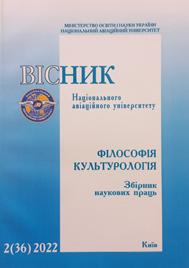THE PROBLEM OF INTER-CIVILIZATIONAL CHALLENGES IN THE SOCIAL DOCTRINE OF THE CATHOLIC CHURCH
DOI:
https://doi.org/10.18372/2412-2157.36.16982Keywords:
globalization, encyclicals, Catholic Church, culture, inter-civilizational challenges, social teachingAbstract
Introduction. Globalization processes in the modern world are the reason for the expansion of inter-civilizational contacts, cooperation,
and at the same time tension. This indicates the strengthening of the inter-civilizational challenge in the modern world and the urgent
need to form a response. The aim and tasks of the article are to examine the approach of the Catholic Church to the problem of intercivilizational
challenges. Research methods determined by the aim of the study include the use of sociocultural and cultural-historical
approaches and the method of conceptual analysis. Research results. The main provisions of Catholic social doctrine in the context of
globalization on the basis of the study of encyclicals, speeches, and works of John Paul II, and Benedict XVI are highlighted. The article
draws attention to the consistency, interconnectedness of their concepts, the formation of a holistic approach to inter-civilizational
problems, and globalization. Particular emphasis is placed on the anthropocentricity and ethics of the Catholic Church's approach to
solving problems caused by globalization. It is emphasized that humanistic values are the basis of the social teaching of the Catholic
Church. The Catholic Church points to an opportunity for humanity to move to a new level of development, to find ways to solve
pressing problems in the process of globalization. The leading role should be played by the dialogue, first of all intercultural, broadly,
inter-civilizational. The constructive inter-civilizational dialogue based on faith and universal human values is, from the point of view of Catholic social teaching, an appropriate response to inter-civilizational challenges. The dialogue foresees the active interaction of
national cultures while preserving their independence and uniqueness. The goal of dialogue, John Paul II and Benedict XVI emphasize, is the man; the joint peaceful activity of mankind to achieve real progress. Discussion. Peculiarities of the approach to the problems
and challenges of globalization in social science are the subject of interest of scientists and philosophical analysis. Conclusion. The
social teaching of the Catholic Church emphasized that one can talk about progress if it provides life, and rights, leads to increasing
standards of man’s living and creates conditions for self-realization. This approach to solving inter-civilizational challenges is relevant to the modern world.
References
Benedykt XVI. Encyklika Caritasinveritate. URL:https://docplayer.pl/ 67746856-Caritas-in-veritate-benedykta-xvi.html
Ioannes Paulus PP. II Sollicitudoreisocialis. URL:https://www.vatican.va/content/john-paul-ii/pl/encyclicals/documents/hf_jp-ii_enc_30121987_sollicitudo-rei-socialis.html
Jan Paweł II. Przekroczyćprógnadziei. URL:https://gorsk.org.pl/wp-content/uploads/2019/09/Etap-3-Przekroczyc_prog_nadziei.pdf
Jan Pawel II. Przemówieniewygłoszone 2 czerwca 1980 roku w UNESCO. URL: https://teologiapolityczna.pl/jan-pawel-iiprzemowienie-
wygloszone-2-czerwca-1980-roku-w-unesco
Joannes Paulus II. Encyklika Centesimusannus. URL:https://www.vatican.va/content/john-paul-ii/pl/encyclicals/documents/hf_jp-ii_enc_01051991_centesimus-annus.html.
Дротянко Л. Г., Ягодзінський С. М. Міжкультурна комунікація і толерантність перед лицем глобальних загроз. Вісник Національного авіаційного університету. Серія: Філософія. Культурологія. Вип. 1(31). К.: НАУ, 2020. С. 15-21.
Загальна декларація прав людини Прийнята і проголошена резолюцією 217 A (III) Генеральної Асамблеї ООН від 10 грудня 1948 року. URL: https://zakon.rada.gov.ua/cgi-bin/laws/main.cgi? nreg=995_015#Tex/.
Клешня Г. М. Концепція сталого розвитку як передумова розвитку соціуму у глобалізованому світі. Вісник Національного авіаційного університету. Серія: Філософія. Культурологія. Вип. 2(30). К.:НАУ, 2020. С. 138-143.
Кошетар У. П. Самоідентифікація локальних цивілізацій в умовах глобалізаційних процесів. Вісник Національного авіаційного університету. Серія: Філософія. Культурологія. Вип. 2(25). К.: НАУ, 2017. С. 57-60.
Матюхіна О. А. Іоанн Павло ІІ про християнські коріння культури Європи. Вісник Національного авіаційного університету. Серія: Філософія. Культурологія. Вип. 2(16). К.: НАУ, 2012. С. 92-95.
Панкевич І. М. Загальна декларація прав людини та вплив її на Конституцію України. Роль загальної декларації прав людини ООН 1948 року в формуванні фундаментальних основ правової системи України: історія і сучасність: матеріали круглого столу. Івано-Франківськ; ДВНЗ «Прикарпатський національний університет імені Василя Стефаника», 2018. 177с.
Ратцінгер Й. Цінності в часи перемін. Долання майбутніх викликів. Львів; Видавництво «Місіонер», 2005. 166 с.
Семенюк Е. Глобалізація: філософський аналіз поняття. Вісник Нац. Ун-ту «Львівська політехніка». № 578. Львів, 2007. С. 10-15.
Скиба І. П. Антропологічний вимір сучасного суспільства в контексті взаємозв’язку науки і свободи. Вісник Національного авіаційного університету. Серія: Філософія. Культурологія. Вип. 2(28). К.: НАУ, 2018. С. 65-73.
Ченбай Н. А. Формування екологічної свідомості як відповідь на виклики сьогодення. Вісник Національного авіаційного університету. Серія: Філософія. Культурологія. Вип. 2(24). К.:НАУ, 2021. С. 71-76.


